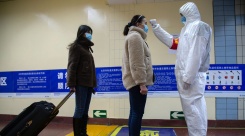Analysis of a Therapeutic Antibody Cocktail Reveals Determinants for Cooperative and Broad Ebolavirus Neutralization
Sarah Glass
April 2, 2020
https://www.cell.com/immunity/fulltext/S1074-7613(20)30028-5#
Structural principles underlying the composition of protective antiviral monoclonal antibody (mAb) cocktails are poorly defined. Here, we exploited antibody cooperativity to develop a therapeutic mAb cocktail against Ebola virus. We systematically analyzed the antibody repertoire in human survivors and identified a pair of potently neutralizing mAbs that cooperatively bound to the ebolavirus glycoprotein (GP). High-resolution structures revealed that in a two-antibody cocktail, molecular mimicry was a major feature of mAb-GP interactions.
Two is Better Than One: Combatting the Ebola Virus
Sarah Glass
March 26, 2020
Many people associate Ebola with the previous viral epidemic of the last decade, but, especially in light of the current global SARS-CoV-2 pandemic, few are aware that there is currently an active outbreak occurring in the Democratic Republic of the Congo. This deadly virus continues to wreak havoc in Africa, where containment of the virus fluctuates as new cases are reported.
Researchers developing potential coronavirus antibody therapies
Bill Snyder
March 23, 2020
Vanderbilt University Medical Center is teaming up with academic, governmental and corporate partners in an unprecedented, fast-tracked global effort to develop antibody-based treatments to protect people exposed to the 2019 novel coronavirus disease, COVID-19.
Researchers from the Vanderbilt Vaccine Center (VVC) have rapidly responded to this outbreak by building a comprehensive “toolkit” to identify and analyze antibodies isolated from the blood of survivors for their ability to neutralize SARS-CoV-2, the virus that causes COVID-19.
Antibody mixture may help block Ebola virus infection
Bill Snyder
February 6, 2020
A research team led by scientists at Vanderbilt University Medical Center has developed an antibody mixture that in animals is highly effective in blocking infection by the Ebola virus.
Reporting in the journal Immunity, these findings “could aid in the design of therapeutic cocktails against other viral targets,” the researchers concluded.
Ebola is a severe and often fatal hemorrhagic fever affecting humans that can be caused by four known Ebola viruses.
Carnahan named associate director of Vaccine Center
Bill Snyder
February 6, 2020
Robert Carnahan, PhD, associate professor of Pediatrics and Radiology and Radiological Sciences, has been appointed associate director of the Vanderbilt Vaccine Center.
“We are thrilled that Dr. Carnahan, who is an accomplished antibody scientist, has taken over this important leadership position in our rapidly expanding research center,” said center director James Crowe Jr., MD.
Academic medicine on the front lines of the coronavirus outbreak
Stacy Weiner
January 30, 2020
As a novel and dangerous coronavirus continues to sicken thousands in China and a few dozen others in countries around the world, including the United States, U.S. academic researchers and government experts are working around the clock to understand, treat, and help prevent further spread of this emerging viral threat.
“We are already functioning as if there is a worldwide pandemic,” says James Crowe, Jr., MD, an immunologist at Vanderbilt University School of Medicine and director of the Vanderbilt Vaccine Center.
Antibody isolated at VUMC found to halt dengue virus
Bill Snyder
January 23, 2020
Using part of an antibody isolated at Vanderbilt University Medical Center that “broadly neutralizes” the human dengue virus, biologists at the University of California San Diego and colleagues have disarmed the mosquito that transmits the disabling and potentially deadly tropical infection.
Targeting NA to protect against lethal avian flu infection
Sohini Roy
January 22, 2020
Asian lineage avian influenza virus (H7N9) is a subtype of influenza virus that can infect humans following exposure to live, infected poultry. There have been several outbreaks since the first reported case in China in 2013, and the mortality rate is as high as 39 percent. Although person-to-person transmission of the virus is unlikely, influenza viruses are constantly evolving into new strains. Therefore, there is a constant threat of emergence of more pathogenic and resistant viruses with the ability to trigger a worldwide pandemic outbreak.
Genetically engineered mosquitoes resist spreading any form of dengue
Kelly Servick
January 16, 2020
Recover from dengue once, and you’re not necessarily free and clear. The mosquito-borne disease marked by fever, rash, and debilitating pain results from any of four genetically distinct versions of the dengue virus. Previously infected people who get hit with a second of these “serotypes” can face more severe, even life-threatening symptoms. Now, by endowing a line of mosquitoes with an antibody against the virus, researchers have for the first time made insects that—at least in lab tests—appear unable to spread any form of the disease.






